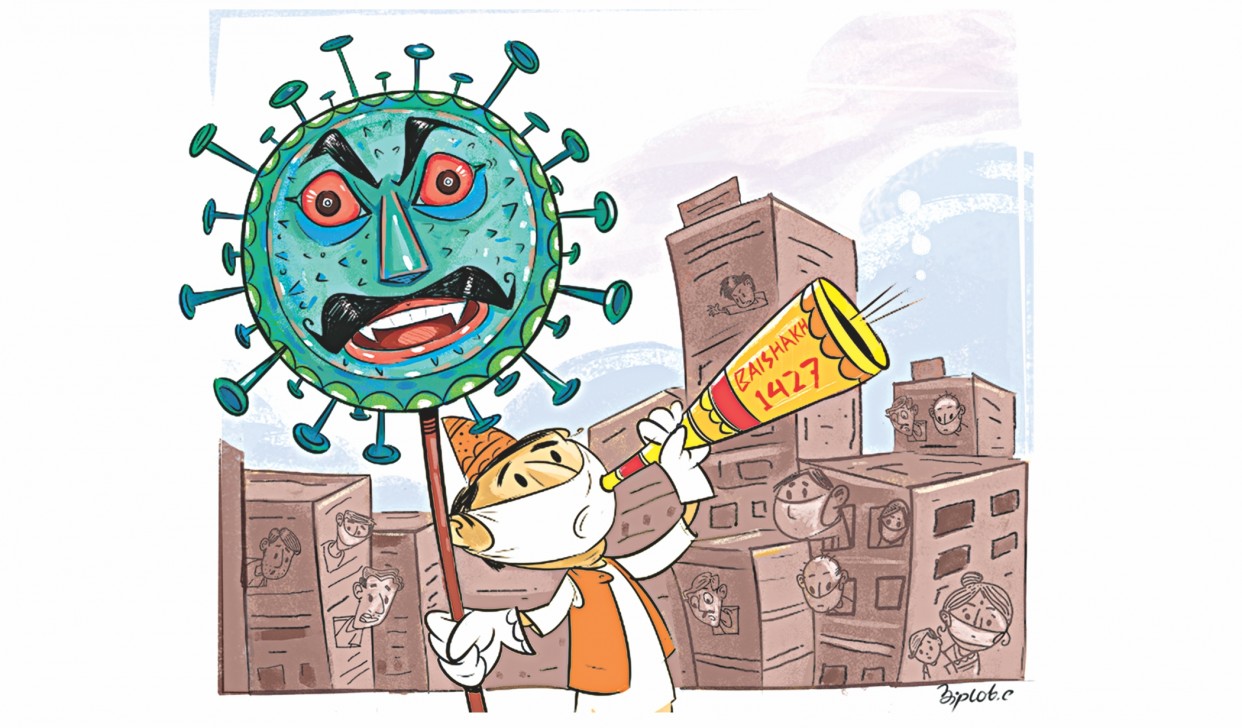Siyam Hoque
Published:2020-04-14 18:49:56 BdST
No festivities but resolve to defeat ills
FT ONLINE
At the crack of dawn today, an air of festivity was supposed to flow across the country.
An overwhelming majority -- irrespective of caste, creed and religious beliefs -- was to come out of their homes, many heading for Ramna Batamul to welcome Pahela Baishakh -- the first day of Bangla New Year 1427 -- amid traditional fanfare and lively pageants.
This year, however, would be completely different.
As the novel coronavirus is taking a grim toll on the country like elsewhere in the world, there would be no one singing along to Rabindranath's "Esho hey Boishakh, esho esho" under the banyan tree. The cultural troupe from Chhayanaut would not be opening the biggest secular celebration of Bangladesh this year.
There would be no "Mangal Shobhajatra", a colourful, ceremonious procession, which is the mainstay of the Pahela Baishakh celebrations.
Traditional Baishakh attires -- white saris with red borders for women and panjabees for men -- would gather dust in shop racks.
After the coronavirus hit Bangladesh, all celebrations have been cancelled, and the normal way of life has come to a halt.
So far, 39 people have died and 803 people have been infected while the country has been under virtual lockdown in its fight to stem the spread of Covid-19.
Prime Minister Sheikh Hasina has directed all to celebrate Pahela Baishakh with their families within the confines of their homes and to refrain from holding mass gatherings.
The government has already suspended all public programmes in order to avoid gatherings amid growing concern over the spread of the virus.
For the first time since the country's liberation, Chhayanaut has had to cancel the celebration at Ramna Batamul. It started the programme in erstwhile East Pakistan in 1967 as a protest against the cultural domination of the Pakistan military regime.
The organisation even held celebrations in 2002, a year after Islamic militants carried out a bomb attack at Batamul celebrations. The attack killed 10 people and injured 50.
"This is the first time except during the Liberation War in 1971 that we are not holding a programme," Sarwar Ali, executive president of Chhayanaut, told The Daily Star yesterday.
In the Pakistan era, Chhayanaut used to arrange the programme to protest the cultural domination of the Pakistan regime and to create a "Milon Mela" for Bangalees, he said.
"After independence, the programme started to spread nationwide and eventually got a national form," he added.
"But this year, Pahela Baishakh comes amid a global disaster. In this situation, we can't consider holding such a programme."
However, renditions of selected songs and poetry from the last three programmes would be telecast on BTV at 7:00am today.
At the end of the hour-long programme, Dr Sanjida Khatun, founder and chair of the organisation, will give a speech, he said.
He also said that the funds collected for the programme are being distributed among poor people or artistes from the low-income bracket.
The Mangal Shobhajatra has also been cancelled for the first time since it started in 1989. Organised by teachers and students of Dhaka University's fine arts faculty, the procession has been inscribed in Unesco's Representative List of Intangible Cultural Heritage of Humanity.
"This is certainly painful for us," said Prof Nisar Hossain, dean of DU's fine arts faculty.
"Everyone eagerly waits for the largest social festival of the country. But it [the coronavirus outbreak] has obstructed the programme entirely," he told The Daily Star yesterday.
"However, our main focus is now on fighting coronavirus," said Nasir.
He said they usually start taking preparations for Mangal Shobhajatra a month before the programme. But as the World Health Organisation declared Covid-19 a pandemic, they feared that they might not be able to hold the programme. "That's why we did not take any preparations."
"The purpose of arranging the Mangal Shobhajatra is to seek blessings for and unite people. But it goes against the method of fighting of coronavirus, which is maintaining social distance," he said.
Like every year, Mangal Shobhajatra Research Center has prepared a poster for this year with a theme considering coronavirus to make people self-reliant to fight the disease.
The poster starts with a quote from famous American author Ernest Hemingway's novel "The Old Man and the Sea" -- "Man can be destroyed but not defeated", and ends with Rabindranath Tagore's song -- "Mukta Karo Bhoy, Apona Majhe Shakti Dharo, Nijere Koro Joy".
"We are circulating the poster online," Nisar said.
Mughal Emperor Akbar introduced the tradition of celebrating the Bangla New Year -- Naba Barsha – to mark the closing of the annual tax collection.
Traditionally, traders and shopkeepers open a new "halkhata" (account register) on this day and celebrate it by offering sweetmeats to their clients.
In the course of time, it evolved into a day of mass celebration and an integral part of the Bangalee culture. It has been considered a non-communal festival as people irrespective of religion, sect, class and creed celebrate the day as one nation.
Unauthorized use or reproduction of The Finance Today content for commercial purposes is strictly prohibited.


